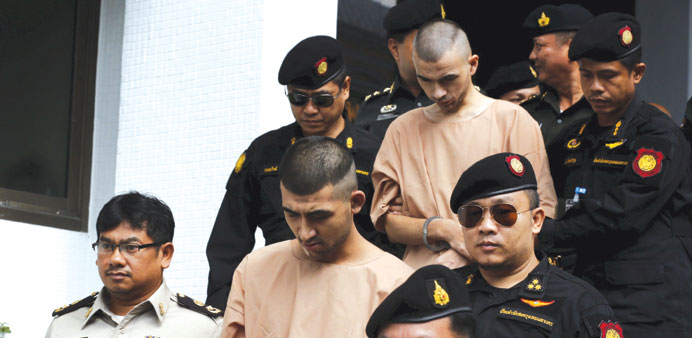AFP/Bangkok
A Thai military court yesterday indicted two Uighurs for a deadly bombing at a Bangkok shrine in August, as the UN called on the ruling junta to stop holding civilian suspects in army detention.
Authorities say both Bilal Mohamed, also known as Adem Karadag, and Yusufu Mieraili have admitted to their roles in the unprecedented attack that killed 20 people and wounded scores more.
The pair are currently incarcerated at a controversial detention facility on the 11th Military Circle barracks in Bangkok where two people recently died in custody in circumstances that have yet to be fully explained.
The UN’s call came shortly after Mohamed and Mieraili appeared before the capital’s military court to hear the charges against them.
“Military prosecutors have decided to indict them on several charges,” said Withtaya Puangpunngam, chief of military prosecutors.
The charges include attempted and premeditated murder, possession of illegal weapons and illegal entry, he said, adding that the accused had “confessed” during earlier police investigations.
The August attack at the Erawan shrine, nestled between plush shopping malls and hotels in a bustling district of central Bangkok, dealt a fresh blow to the nation’s image as a holiday paradise.
The capital was already recovering from months of often violent street protests that ended in the May 2014 military coup that toppled an elected government.
Mystery still shrouds the motive for the unclaimed attack, with police still not confirming the nationalities of the suspects.
The shrine that was targeted is particularly popular among ethnic Chinese visitors from across Asia, who made up the majority of those killed.
Strong speculation had centred on a link to militants or supporters of the Uighurs, an ethnic group who say they face persecution in their homeland in China’s Xinjiang region, after Thailand in July forcibly deported a group of 109 Uighurs back to China.
According to his lawyer, Mohamed is a Chinese Uighur who settled in Turkey while Mieraili is a Chinese passport-holder of Uighur ethnicity.
Thai police have rejected the notion that the bomb was a revenge attack for the recent deportations. Instead investigators say they believe a people-smuggling gang was angered by a crackdown on its business -- a theory many analysts have questioned.
China yesterday said it hoped justice would be delivered.
“This bombing fully reveals the barbarity of the criminals,” Hong Lei, spokesman for China’s Ministry of Foreign Affairs, told reporters at a regular briefing.
“We hope that justice can be delivered, and relevant people can be held accountable for what they have done.”
The use of military courts has dramatically increased in Thailand since last year’s coup and in September the temporary remand facility on the Bangkok barracks was formally announced. In its statement yesterday, the UN echoed calls made by rights groups in recent months.
“The use of a military barracks as a detention facility is prone to human rights violations, including torture,” said Matilda Bogner from the UN Human Rights Office for South East Asia, calling for an impartial investigation into the two recent custodial deaths.
The dead inmates, who were swiftly cremated, were caught up in a shadowy royal defamation probe that has ensnared senior military and police officials.
The UN added that it had received reports a lawyer representing one of the Bangkok bomb suspects “was not allowed to meet with his client in a confidential manner, and that he had his questions screened beforehand” at the barracks.

Suspects in the Bangkok blast, referred to as Yusufu Mieraili (second left), and Bilal Mohamed (also known as Adem Karadag), are escorted by soldiers
